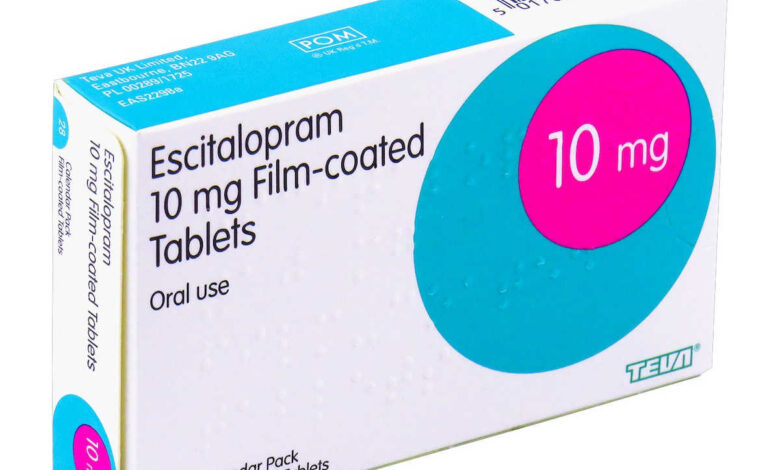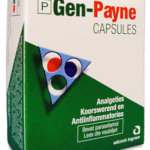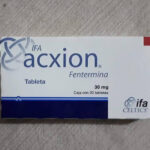Escitaloprám: Uses, Side Effects Warning, Reviews

Escitaloprám is in a class of antidepressants called selective serotonin reuptake inhibitors (SSRIs). It works by increasing the amount of serotonin, a natural substance in the brain that helps maintain mental balance. Escitaloprám is used to treat depression in adults and children and teenagers 12 years of age or older. Escitaloprám is also used to treat generalized anxiety disorder (GAD; excessive worry and tension that disrupts daily life and lasts for 6 months or longer) in adults.
Escitaloprám works by increasing levels of a neurotransmitter called serotonin in the brain. Increased serotonin levels can lead to an improved mood. The medication usually begins to work within 2 to 4 weeks. However, it may take several weeks of treatment before the full effects are seen.
This medication may be available under multiple brand names and/or in several different forms. Any specific brand name of this medication may not be available in all of the forms or approved for all of the conditions discussed here. As well, some forms of this medication may not be used for all of the conditions discussed here.
How should Escitaloprám be used?
Escitaloprám comes as a tablet and a solution (liquid) to take by mouth. It is usually taken once a day with or without food. To help you remember to take Escitaloprám, take it at around the same time every day, in the morning or in the evening. Follow the directions on your prescription label carefully, and ask your doctor or pharmacist to explain any part you do not understand. Take Escitaloprám exactly as directed. Do not take more or less of it or take it more often than prescribed by your doctor.
Your doctor may start you on a low dose of Escitaloprám and increase your dose after 1 week.
It may take 1 to 4 weeks or longer before you feel the full benefit of Escitaloprám. Continue to take Escitaloprám even if you feel well. Do not stop taking Escitaloprám without talking to your doctor. If you suddenly stop taking Escitaloprám, you may experience withdrawal symptoms such as mood changes, irritability, agitation, nausea, dizziness, burning, numbness, or tingling in the hands or feet, anxiety, confusion, headache, sweating, tiredness, and difficulty falling asleep or staying asleep. Your doctor will probably decrease your dose gradually.
What are the side effects of Escitaloprám?
Many medications can cause side effects. A side effect is an unwanted response to a medication when it is taken in normal doses. Side effects can be mild or severe, temporary or permanent.
The side effects listed below are not experienced by everyone who takes this medication. If you are concerned about side effects, discuss the risks and benefits of this medication with your doctor.
The following side effects have been reported by at least 1% of people taking this medication. Many of these side effects can be managed, and some may go away on their own over time.
Contact your doctor if you experience these side effects and they are severe or bothersome. Your pharmacist may be able to advise you on managing side effects.
- changes in heart rate
- congested or runny nose
- constipation
- diarrhea
- difficulty sleeping
- dizziness
- drowsiness
- dry mouth
- fatigue
- fever
- heartburn
- increased sweating
- insomnia
- loss of appetite
- muscle or joint pain
- nausea
- sexual dysfunction including:
- decreased libido (sex drive)
- erectile dysfunction (difficulty getting or keeping an erection)
- inability to have an orgasm
- stomach pain
- stomach upset
- yawning
Although most of the side effects listed below don’t happen very often, they could lead to serious problems if you do not check with your doctor or seek medical attention.
Check with your doctor as soon as possible if any of the following side effects occur:
- anxiety
- bruising or unusual bleeding from the skin or other areas
- difficulty controlling blood sugar levels
- feeling of skin prickling
- hallucinations
- inability to urinate
- involuntary movements of the body or face
- low blood sodium (confusion, seizures, drowsiness, dryness of mouth, increased thirst, lack of energy)
- mania (overactive behavior and thoughts)
- new or worsening emotional symptoms
- severe agitation or restlessness
- symptoms of glaucoma, e.g.:
- increased pressure in the eye
- eye pain
- blurred vision
- symptoms of liver damage, e.g.:
- abdominal pain
- dark urine
- clay-coloured stools
- itching
- loss of appetite
- nausea and vomiting
- yellow skin or eyes
Stop taking the medication and seek immediate medical attention if any of the following occur:
- seizure or convulsions
- serotonin syndrome or neuroleptic malignant syndrome – signs include:
- agitation
- confusion
- diarrhea
- fever
- overactive reflexes
- poor coordination
- restlessness
- shivering
- sweating
- talking or acting with excitement you cannot control
- trembling or shaking
- twitching
- symptoms of an abnormal rhythm such as heart palpitations, dizziness, or fainting
- symptoms of a serious allergic reaction such as swelling of the face or throat, hives, or difficulty breathing
- thoughts of suicide or hurting yourself
- vomiting blood or presence of blood in the stool
Some people may experience side effects other than those listed. Check with your doctor if you notice any symptom that worries you while you are taking this medication.
Escitaloprám Safety Information
A small number of children, teenagers, and young adults (up to 24 years of age) who took antidepressants (‘mood elevators’) such as Escitaloprám during clinical studies became suicidal (thinking about harming or killing oneself or planning or trying to do so). Children, teenagers, and young adults who take antidepressants to treat depression or other mental illnesses may be more likely to become suicidal than children, teenagers, and young adults who do not take antidepressants to treat these conditions. However, experts are not sure about how great this risk is and how much it should be considered in deciding whether a child or teenager should take an antidepressant. Children younger than 12 years of age should not normally take Escitaloprám, but in some cases, a doctor may decide that Escitaloprám is the best medication to treat a child’s condition.
You should know that your mental health may change in unexpected ways when you take Escitaloprám or other antidepressants even if you are an adult over 24 years of age. You may become suicidal, especially at the beginning of your treatment and any time that your dose is increased or decreased. You, your family, or your caregiver should call your doctor right away if you experience any of the following symptoms: new or worsening depression; thinking about harming or killing yourself, or planning or trying to do so; extreme worry; agitation; panic attacks; difficulty falling asleep or staying asleep; aggressive behavior; irritability; acting without thinking; severe restlessness; and frenzied abnormal excitement. Be sure that your family or caregiver knows which symptoms may be serious so they can call the doctor if you are unable to seek treatment on your own.
Your healthcare provider will want to see you often while you are taking Escitaloprám, especially at the beginning of your treatment. Be sure to keep all appointments for office visits with your doctor.
The doctor or pharmacist will give you the manufacturer’s patient information sheet (Medication Guide) when you begin treatment with Escitaloprám. Read the information carefully and ask your doctor or pharmacist if you have any questions. You also can obtain the Medication Guide from the FDA website: http://www.fda.gov/Drugs/DrugSafety/ucm085729.htm.
No matter your age, before you take an antidepressant, you, your parent, or your caregiver should talk to your doctor about the risks and benefits of treating your condition with an antidepressant or with other treatments. You should also talk about the risks and benefits of not treating your condition. You should know that having depression or another mental illness greatly increases the risk that you will become suicidal. Tell your doctor if you or anyone in your family has or has ever had bipolar disorder (mood that changes from depressed to abnormally excited) or mania (frenzied, abnormally excited mood) or has thought about or attempted suicide. Talk to your doctor about your condition, symptoms, and personal and family medical history. You and your doctor will decide what type of treatment is right for you.





